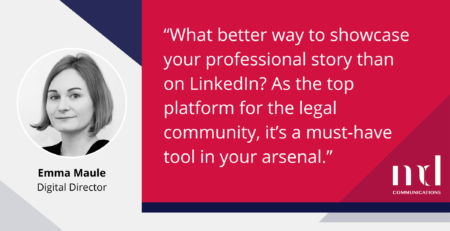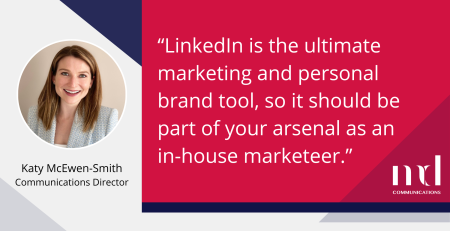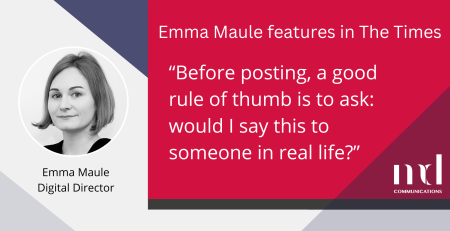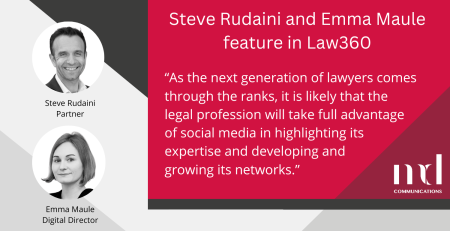Social media and lawyers may not seem a natural fit but this combination is beginning to prove profitable for those that have been early on the uptake.
The way that lawyers use social media varies widely across the sector, from embracing everything, including Instagram and YouTube, to barely maintaining a single platform. For most, there is still plenty of room for improvement.
How not to use social media
At MD Communications we have helped to correct many social media errors made by legal clients. Some of the biggest mistakes have included:
- Multiple accounts, badly maintained. Accounts that are poorly maintained can do damage to a social reputation. Better to focus on one and maintain it regularly – three tweets/posts per day is the optimum to sustain.
- Lots of followers, zero reciprocal engagement. So many in law fail to grasp the necessity to like, comment and retweet on other’s posts – no matter how many followers you have, without engagement your ROI is zero.
- Shouting headlines into the ether. Lawyers are often guilty of ‘broadcasting’ like a news outlet – this goes against one of the key ideas behind the creation of social media: starting conversations.
- Boring, text-based tweets. Many firms fall down on multimedia. Law may be a words-based industry but it’s those using images – and more – that are doing the best in social terms.
How to do better
Social media represents an enormous opportunity for lawyers and firms, not just to attract new clients but to change industry perceptions and carry out in-depth, real-time market research. So, how can firms use it to create an advantage?
Social listening
Social listening is a trend taking off in sectors such as retail and banking, informing market research and providing an opportunity to learn the language of your audience.
It involves social monitoring – i.e. tracking certain key phrases, words and @mentions – and then analysing the results to look for trends, themes and inspiration. Social listening also offers the opportunity to spot a crisis early – bad PR, a confidential leak etc – and to act before it blows up out of all proportion.
- Use it for real-time market insights
- Set up automatic tracking and analytics to save time and effort
- Set your goals in advance – what are you looking to learn?
Advertising
The great advantage of social advertising is that it’s far subtler than more traditional methods. A Promoted Tweet is much less intrusive than a TV ad or a cold email, for example.
There can be a trust barrier for legal consumers when it comes to firms that seem distant and corporate and social advertising, with its more informal tone, can be an easy way to break this down. Plus, social advertising is extremely cost effective – you can buy advertising in small, cheap quantities that can achieve results far in excess of spend.
- Decide what you want your advertising to achieve and tailor spend and strategy to that
- Focus on one platform initially
- Incorporate media into your ads, as this tends to get more engagement
Customer service
Data firm Nielsen has found that 33% of customers prefer to contact brands using social media rather than the telephone. The opportunity for improving client and customer service applies as much to law as any other industry.
Ok, so it may not be the method of choice for the Fortune 500 CEO (although you never know) but it’s increasingly becoming the most effective way to provide a fast and personable service, especially to younger consumers.
- Set up a separate social account for customer service only
- Make sure you don’t leave customer service social accounts unattended
- Establish a clear guide for operators – tone of voice, what is acceptable, when to escalate.
Thought leadership
Everyone, from executives to primary school teachers, has a social media account these days. Given the degree of crossover between life and work, platforms like Twitter and Facebook represent an easy way to open a conversation and establish a profile for expertise, whether formally or informally.
Posting and tweeting articles and white papers, sharing information and distributing knowledge combine to create a fast path to being seen as a ‘go to’ for specific advice and expertise – a legal influencer, if you like.
- Time spent on content generation is never wasted
- Focus on your specific area of expertise and build from there
- Be reciprocal – don’t expect others to respond to your posts if you don’t respond to theirs.
Perhaps most importantly of all, social media gives law firms an opportunity to humanise a brand. In a world where cold corporate marketing increasingly falls down that’s a rare and precious thing.
Need help with social media? We do social media audits for both personal and firm brands, as well as training.
Contact us for more details.
We have several guides on how to effectively manage your LinkedIn and Twitter accounts – request your copies.












